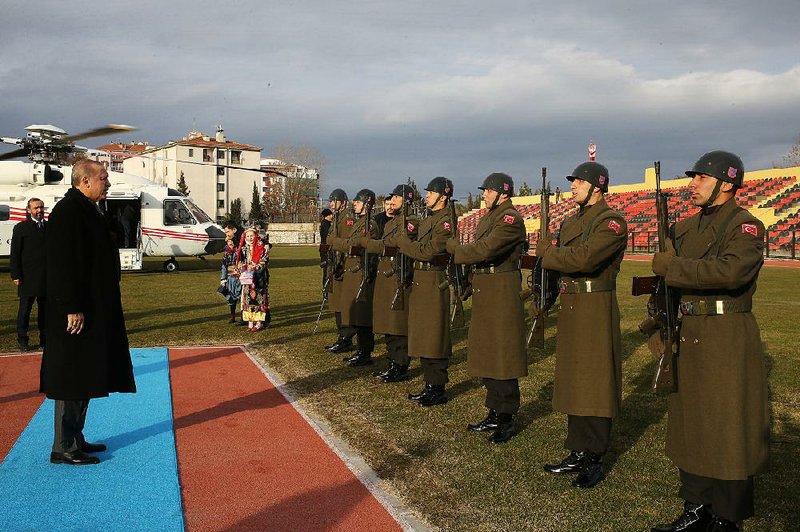KOCABEYLI, Turkey -- Turkish jets bombed the Kurdish-controlled city of Afrin in northern Syria on Saturday, as President Recep Tayyip Erdogan promised to expand Turkey's military border operations against a Kurdish group that has been the U.S.' key Syria ally in the war on the Islamic State group.
The raids came on the heels of a week of sharp threats by the Turkish government, promising to clear the Kurdish People's Protection Units from Afrin and its surrounding countryside, also called Afrin. Turkey's military is calling the campaign Operation Olive Branch.
Turkey says the People's Protection Units -- a group it considers a terrorist organization -- is an extension of an outlawed Kurdish rebel group that it is fighting inside its own borders, and it has found common cause with Syrian opposition groups who view the People's Protection Units as a counterrevolutionary force in Syria's multisided civil war.
Turkish Prime Minister Binali Yildirim said a ground offensive could begin today, but the state-run Anadolu News Agency reported that Syrian forces backed by Ankara had already penetrated the Kurdish enclave. They crossed over from Turkey but were turned back by the People's Protection Units, according to Rojhat Roj, a Kurdish spokesman.
Associated Press journalists at the Turkish border saw jets bombing positions in the direction of Afrin, as a convoy of armed pickups and buses believed to be carrying Syrian opposition fighters traveled along the border.
Roads out of the Afrin were closed and the People's Protection Units were not allowing anyone to leave the city, but morale was high, according to a resident who was reached by phone.
"So far the People's Protection Units have not called on the people to mobilize," said Ramzi Hamidi. Turkey, he said, "will learn a lesson they have not learned before."
Ten civilians were wounded in the airstrikes, three seriously, according to Roj.
Turkey has prepared around 10,000 Syrian fighters to storm Afrin, according Rami Abudrrahman, director of the Syrian Observatory for Human Rights monitoring group. A rebel commander speaking to the AP by phone from northern Syria said there were thousands of fighters positioned in Azaz, at the frontier with the Kurdish enclave, awaiting orders. Another commander said hundreds more were stationed in Atmeh, south of Afrin. The officials spoke on the condition of anonymity because they were not authorized to speak to the media.
The Russian Defense Ministry said, meanwhile, that it was pulling back troops that had been deployed near Afrin, two days after Turkey's military and intelligence chiefs traveled to Moscow to discuss the planned operation. It said the group of observers was being relocated to another area. It was not immediately clear how many troops were affected by the move.
The People's Protection Units is the driving force behind a coalition of northern Syrian forces allied with the U.S. to battle the Islamic State group. With U.S. support, including around 2,000 embedded forces, the coalition now controls close to a quarter of Syrian territory, concentrated mostly to the north and east of the Euphrates River.
Turkish leaders were infuriated by an announcement by the U.S. military six days ago that it was going to create a 30,000-strong border force with the Kurdish fighters to secure northern Syria. Days later, Secretary of State Rex Tillerson announced that the U.S. would maintain a military presence with the Kurds for the foreseeable future.
Speaking in the city of Kutahya in western Turkey, Erdogan announced an expansion to Turkish operations in Syria, promising to move on the Kurdish-controlled town of Manbij and its surrounding countryside after completing operations in Afrin.
In 2016, Turkey trained and equipped opposition forces to drive Kurdish fighters out of parts of northern Syria, driving a wedge between two enclaves along the Turkish frontier. Turkish ground forces, including tanks and artillery, crossed into Syria with the fighters to establish a zone flanked by Afrin and Manbij that now serves as hub for Turkish operations.
Yildirim said the strikes on Afrin marked the start of a campaign to "eliminate the PYD and PKK and Daesh elements in Afrin," referring to the Kurdish Democratic Union Party and the Kurdistan Workers' Party, and using an Arabic acronym for the Islamic State group.
The Democratic Union Party, Kurdistan Workers' Party, and People's Protection Units all look to the Kurdish Marxist-nationalist leader Abdullah Ocalan as their guide. Ocalan is imprisoned by Turkey for waging a separatist movement in the eastern part of the country. The Islamic State group does not have a presence in Afrin.
The airstrikes were accompanied by waves of artillery strikes on the Afrin region. Syria's Foreign Ministry promptly condemned the Turkish operation.
Turkish Foreign Minister Mevlut Cavusoglu discussed the operation with Tillerson by phone after the U.S. diplomat requested a conversation, Turkish officials said. They did not provide further details.
The U.S. Department of State also said Tillerson spoke by phone on Saturday with Russian Foreign Minister Sergey Lavrov.
No details about the calls were immediately available. But the U.S. State Department has said previously that it's urging against escalation and sending that message directly to those involved in the conflict.
Information for this article was contributed by Suzan Fraser and Bassem Mroue of The Associated Press.
A Section on 01/21/2018
